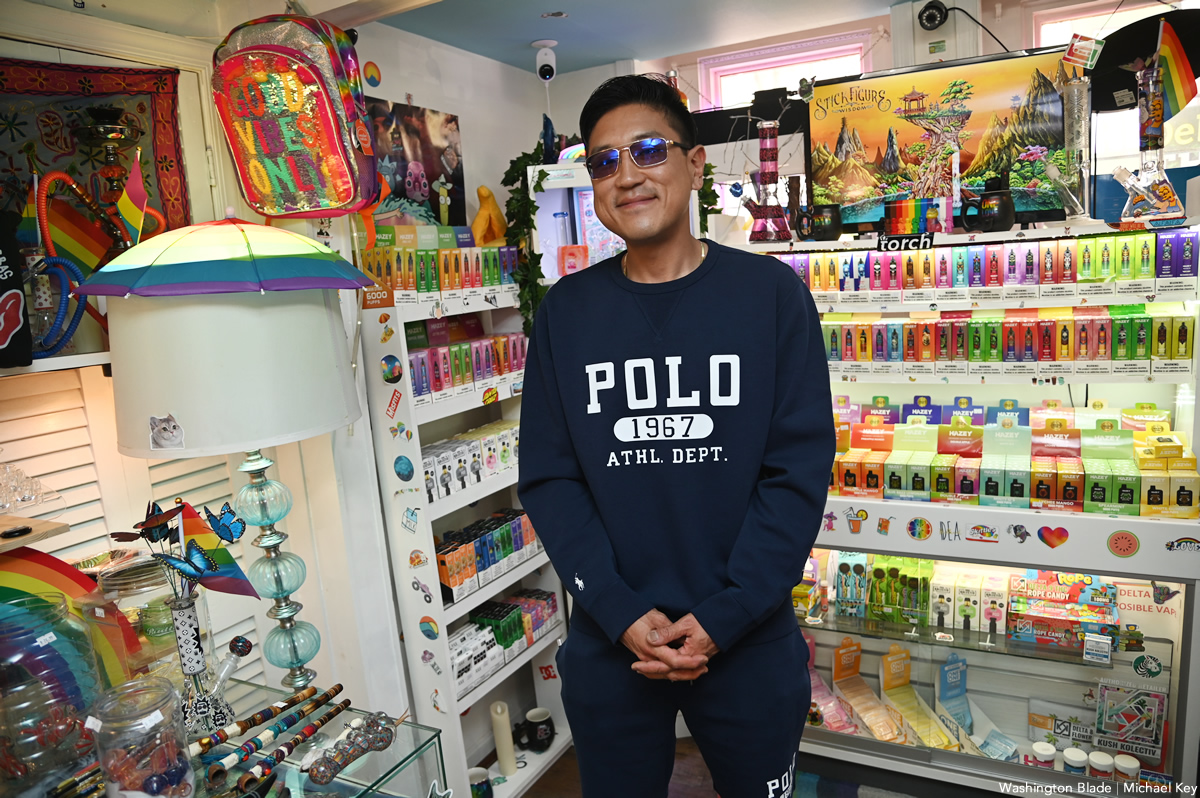Arts & Entertainment
National Cannabis Festival features out vendors like D.C.’s Sean Kim
Owner of Pride Smoke Shop on coming out, embracing his dream

Ahead of the April 22 National Cannabis Festival, the Washington Blade caught up with Sean Kim on Friday at his store, Pride Smoke Shop, a smoke, gift, vape shop, and glass gallery located near Dupont Circle at 21st and P streets, N.W.
“I want to show the community that I’m here for everybody,” he said, “And I’m not afraid anymore.”
This year will be Kim’s first National Cannabis Festival, and he is looking forward to setting up shop with two connected booths, “It’s amazing, actually, they put us near an LGBTQ pavilion that they have,” he said.
As a sponsor of the event, the Blade will be stationed nearby. Tickets are still available for the Festival, which will feature an all-day concert along with “exhibitors, education pavilions, munchies zone, sponsored lounges and more.”
“It’s gonna be amazing,” Kim said. “I’m so excited. We have a lot of stuff planned.”
The event’s organizers are debuting the designated LGBTQ space this year. A spokesperson told the Blade by phone it is designed to be a “chill spot for the community,” a place where “you can take a load off,” they said, noting there will also be a seniors’ lounge.
Kim said Pride Smoke Shop represents his entrée into a new phase of his life, where he is free to live authentically as himself, his full self – out of the closet as LGBTQ, the sole proprietor of a smoke shop who had abandoned a successful career in auto sales to chase his dream of starting the business.
The endeavor has been successful. In fact, for this interview Kim had traveled back to D.C. from Atlantic City, N.J., where he is planning to open a second location of his store.
“As I got older and realized time is short on this earth, I became the true me – the person that I had suppressed for years and years, almost decades,” Kim said. “And I just became free.”
The decision to start his business came like an epiphany, he told the Blade. “I just woke up one morning and I was just like, I don’t want to be an old man looking back and thinking ‘I’ve lived this lie my whole life,'” Kim said.
Working in a corporate job had brought Kim considerable success, but while he was earning a comfortable living in accordance with his family’s wishes and expectations, he said, “I wasn’t happy.”
“It was my awakening, you know, no more being afraid of whatever stigmas, other people — I just don’t care anymore,” Kim said. “I want to be me and do what I love.”
The nature of Kim’s business also meant he would be coming out again and again. “For years and decades, even, I hid it from a lot of people – family, even a lot of friends,” he said. “I grew up in a Korean American household where it’s not even a question — you just don’t smoke.”
For this reason, Kim said, he felt like even more of “an odd one.”
When it comes to the location of his shop, Kim is cognizant that he was hardly the first LGBTQ person to venture into a certain Washington, D.C. neighborhood in search of refuge and the company of others who are different.
When I was younger, I always heard of Dupont [Circle] as like a safe place for our community,” Kim said, so his decision to situate his business there was an easy one — a homecoming of sorts to “the place where I felt safest, always.”
When it comes to the name of his business, “I couldn’t think of any word” other than Pride that would exemplify the idea that “this is me now, no questions asked, this is what I represent,” Kim said, adding “it’s pride of everything,” of his whole identity and everything that entails.
The name also touches on the idea that “a smoke shop can thrive,” he said, “that it’s not a terrible thing.”
For his parents, Kim said, “It was like the biggest shock, but now they’re my biggest supporters.”
The change of heart did not come easily, though. “It was very hard,” Kim said. “For my dad, it was the toughest thing. And now he’s the first person to fight for me, you know? If someone tries to say something, and he’s in construction, so he’s the first guy pulling up in his truck with all his tools come in to fix whatever.”
“My dad is bringing his workers,” Kim continued, “but then I see him, like, he has no questions, you know, he brings them right in, like, you can even see his workers’ faces looking around, like, you know, they see all the [LGBTQ pride] flags, so they get it.”
Customers “get it” too. Pride Smoke Shop is a window into its owner’s life, personality, and tastes.
“You’ll see my vision of my store” just by walking in, Kim said. “It’s just my favorite things,” like the “Wu Tang symbol on the ground” to celebrate “one of my favorite artists,” to “Lucy Ricardo’s picture [hanging] because ‘I Love Lucy’ is my favorite show,” he said. “Richie Rich was my favorite comic and you’ll see that influence. It’s just everything I love, and I’m here to just showcase that this is me.”

Arts & Entertainment
Win a pair of tickets to Grace Jones & Janelle Monáe @ The Anthem on June 5, 2025!


The Cherry Weekend main event party was “Fire” at Betty (1235 W Street, N.E.) on Saturday, April 12. Detox of “RuPaul’s Drag Race” met with fans.
(Washington Blade photos by Michael Key)















‘Uncle Vanya’
Through April 20
Shakespeare Theatre Company
Harman Hall
610 F St., N.W.
Shakespearetheatre.org
Shakespeare Theatre Company’s “Uncle Vanya” freshly rendered by director Simon Godwin and starring Hugh Bonneville in the title role, puts a pleasing twist on Chekhov’s tragicomic classic.
As disheveled, disheartened, and overworked Vanya, Bonneville is terrific. Though very different from the actor’s fame making role as Downton Abbey’s Lord Grantham, a proud, fastidiously turned-out aristocrat who presides over a manicured country estate peopled by a large staff, his Vanya is equally compelling
For “Uncle Vanya,” Chekhov imagines a house on a ragged estate in the Russian forest whose inhabitants display varying degrees of discontent brought on by the realization that they’re leading wasted lives. Middle-aged Vanya’s dissatisfaction and disappointment have been tempered by years of hard work. But all of that is about to be challenged.
With his plain and steadfast niece Sonya (Melanie Field), Vanya keeps the place going. And while barely putting aside a kopek for himself, he’s ensured that proceeds have gone to Sonya’s father Alexandre, a querulous academic (Tom Nelis), and his alluring, much younger second wife Yelena (Ito Aghayere) who live in the city.
When called to retire, the self-important professor and his wife economize by joining the family in the country. Overcome by the intense boredom brought on by provincial isolation, they’re not happy. Turns out, life in the sticks isn’t for them.
At the same time, the urban couple’s presence generates quite an effect on the rural household, changing the mood from one of regular work to idleness. What’s more, Vanya and family friend Mikhaíl Ástrov (John Benjamin Hickey), an unusually eco-aware, country doctor, are both bewitched by Yelena.
Meanwhile, young Sonya, who’s long carried an unrequited torch for Ástrov grows increasingly smitten. And while Yelena, who’s bored with her aging husband, expresses teasing tenderness with Vanya, she feels something more serious for Ástrov. It’s a whole lot for one house.
Superbly staged by Simon Godwin, STC’s artistic director, and performed by a topnotch cast, the very human production begins on an unfinished stage cluttered with costume racks and assorted props, all assembled by crew in black and actors in street clothes. We first see them arranging pillows and rugs for an outside scene. Throughout the play, the actors continue to assist with set changes accompanied by an underscore of melancholic cello strings.
With each subsequent scene, the work moves deeper into Chekhov’s late 19th century Russian world from the kitchen to the drawing room thanks in part to scenic designer Robert Brill’s subtle sets and Susan Hilferty and Heather C. Freedman’s period costumes as well as Jen Schriever’s emotive lighting design.
In moments of stillness, the set with its painterly muted tones and spare furnishings is a domestic interior from a moment in time. It’s really something.
Adapted by contemporary Irish playwright Conor McPherson, the work is infused with mordant wit, ribald comedy, and sadness. Like McPherson’s 2006 play “The Seafarer” in which the action unfolds among family, friends and others in a modest house filled with confrontation, laughter, resentment, and sadness. All on brand.
For much of “Uncle Vanya,” McPherson’s script leans into humor, funny slights, the professor’s pretentions, and Vanya’s delicious snarky asides; but after the interval, the play’s stakes become perilously heightened ready to explode with resentment and feelings of wasted potential, particularly frustrations expressed by Vanya and his intelligent but unfulfilled mother (Sharon Lockwood).
When it appears that mismatched couple Alexandre and Yelena are poised to depart, the house is struck with a sense of both relief and gloom.
Not everyone is disturbed. In fact, the family’s old nanny Nana (Nancy Robinette), and Waffles (Craig Wallace), a former landowner and now lodger on the estate, are elated. Both are eager to return to the pre-professor schedule of an early breakfast and midday lunch, and menus featuring simpler fare. They long for the return of the humble Russian noodle.
“Uncle Vanya”melds cynicism and hope. Like life, it’s a grasp at fulfillment.
-

 District of Columbia5 days ago
District of Columbia5 days agoWorldPride organizers may warn trans people from abroad not to attend event
-

 Opinions4 days ago
Opinions4 days agoIt’s time for new leadership on the Maryland LGBTQIA+ Commission
-

 The White House3 days ago
The White House3 days agoWhite House does not ‘respond’ to reporters’ requests with pronouns included
-

 Noticias en Español4 days ago
Noticias en Español4 days agoINDIGNACIÓN: ¡El transfeminicidio de Sara Millerey en Colombia nos cuestiona como sociedad!












